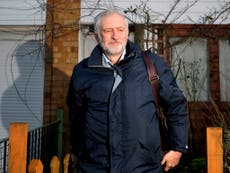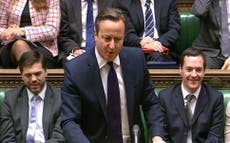Corbyn's Labour reshuffle signals a likely return to unilateralism
By ousting Maria Eagle, Corbyn removed an obstacle to his goal of ending Labour support for Britain’s nuclear weapons


Slowly but surely, Jeremy Corbyn remakes Labour in his own image. True, his first shadow cabinet reshuffle was a long-running farce. His aides were foolish to raise great expectations of wide-ranging changes and slow to kill claims of a “revenge reshuffle” of those who rebelled over UK air strikes on Syria. His advisers are learner drivers who must learn on the job at breakneck speed. They now know rule one of politics: better to under-promise and over-deliver than the other way round.
To make it an open secret that Corbyn wanted to move Hilary Benn, and then keep him in place as shadow Foreign Secretary smacks of weakness. All leaders hope that shaking up their frontbench team will demonstrate strength but it doesn’t always work out like that. Corbynites claim Benn has been reined in, but he insists he has not been “muzzled” – hardly a great victory.
Of course, in the eyes of some, Corbyn was damned if he did and damned if he didn’t. He usually is, not least by right-wing newspapers. His reshuffle was either going to be a Stalinist purge or a damp squib. With Benn still in situ, it will be seen as the latter. And after yesterday’s resignations by three junior frontbenchers angry at the sacking of the Blairite Pat McFadden as Europe spokesman, the reshuffle will doubtless be dubbed a disastrous own goal.
The changes to the Shadow Cabinet were more limited than desired by some Corbyn advisers; they wanted to see the back of Dame Rosie Winterton, who retains the pivotal role of Chief Whip. Yet Corbyn did achieve one important objective. By ousting Maria Eagle, a supporter of Trident, from the defence brief, he removed an obstacle to his goal of ending Labour’s support for Britain’s nuclear weapons. That would take Labour back to its unilateralist stance at the 1983 general election (when it won 28 per cent of the vote).
Corbyn is lining up his ducks. He plans an online ballot of Labour members on whether to support the renewal of Trident. A review, headed jointly by his ally Ken Livingstone and Emily Thornberry, the new shadow Defence Secretary and a Trident opponent, looks certain to recommend a change of policy to the party conference in autumn. It might look rather academic since the Commons will probably have voted to renew Trident by then. But it would still matter at the 2020 general election, when the Conservatives will seek to portray Labour as weak on national security.
Benn and several shadow cabinet allies support Trident. But, if Labour’s policy changes, they will not be given free rein by Corbyn to oppose him publicly from the frontbench. In other words, they would have to resign, or would be sacked.
So, at one level, the Labour leader’s hand has been strengthened. Although the reshuffle spilled more bad blood, there are conflicting currents among Labour backbenchers. Only 20 of 232 Labour MPs voted for Corbyn to be leader. So it has been assumed that, were he challenged for the leadership, he would struggle for the nominations of 51 MPs and MEPs needed to get on the ballot. Hence his plan to change the rules to ensure a sitting leader has an automatic right to stand.
But now some critics accept he would secure 51 nominations, since a growing number of MPs acknowledge his mandate from party members and think he may lead Labour into the 2020 election. Others fear deselection by their constituency parties if they did not support him. “We wouldn’t be able to keep him off the ballot,” one former shadow cabinet member admits.
Despite that, opponents have not given up hope of forcing Corbyn out before 2020. He may get his “no nukes” policy, but his critics inside the Shadow Cabinet have a nuclear weapon of their own – the threat of mass resignations. They deployed it this week to keep Benn in his job. They also used it in November to secure a free vote on air strikes in Syria – again, against the initial wishes of Team Corbyn.
Like David Cameron’s move to give cabinet ministers free rein on Europe, the Labour reshuffle is a sticking-plaster solution that resolves very little. If the sacking of the outspoken Michael Dugher and McFadden was meant to restore discipline, then it has failed. The most significant act of Labour’s farce was the public support for Dugher from nine shadow cabinet members – notably Tom Watson, the deputy leader, whom Corbyn cannot sack because he, too, was elected by Labour members and supporters. This was open defiance at the very moment Corbyn was trying to restore loyalty and unity.
It was a reminder that the war between Labour’s two tribes will continue. At some point, the critics may decide to press their nuclear button and resign en masse. It could happen if backbench opponents mount a coup following poor results this May in elections for the London Mayor, local authorities, the Scottish Parliament and Welsh Assembly. “It is only a question of when, not if,” said one Corbyn critic.
In his four months as leader, Corbyn has been unlucky that foreign and national security issues have been so dominant. The 250,000 members and supporters who voted for him were surely more attracted by his anti-austerity message and promise of a new politics than his views on Trident or foreign affairs. It is a source of huge frustration to Corbynites that Labour has been unable to make headway on the economy, on which it would have been much easier to unite the party.
But leadership requires decisive action when “events” happen and to date Corbyn has been leaden-footed. Labour has looked preoccupied with its internal machinations, making it harder to land blows on the Government on the economy, Europe and the floods – on which Labour’s message about vital public investment should have been heard much louder. Before Christmas, Corbyn allies spoke of hitting the ground running in 2016. Instead, Labour has limped into the new year.



Join our commenting forum
Join thought-provoking conversations, follow other Independent readers and see their replies